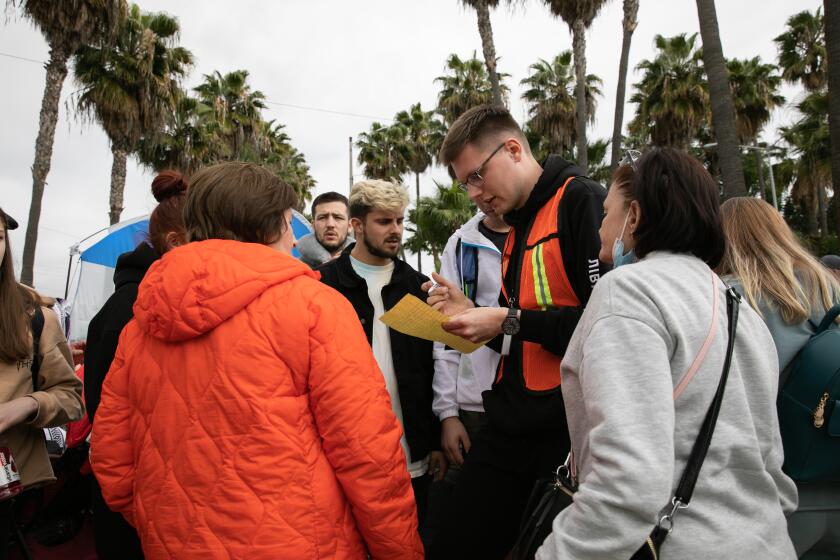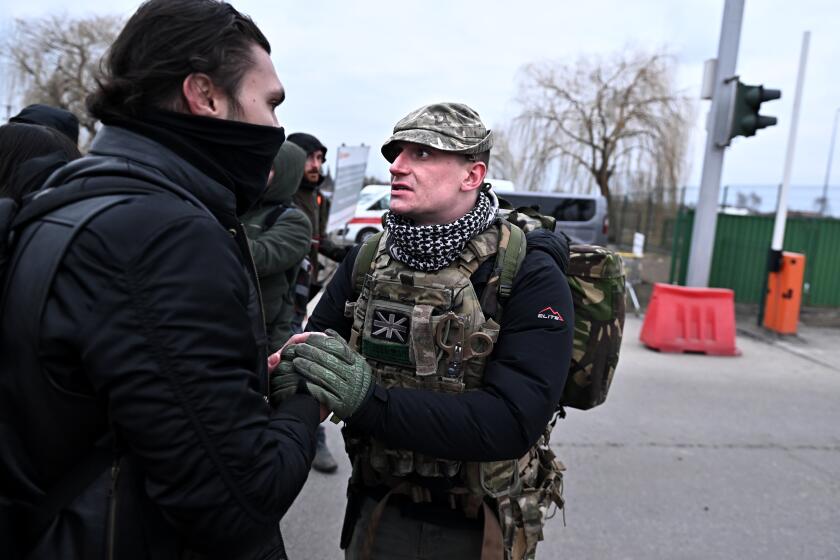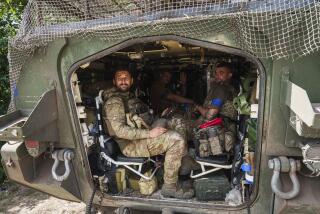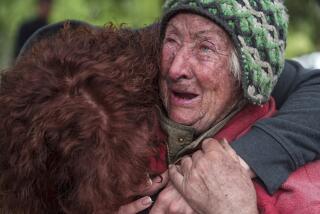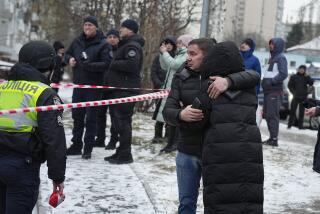Ukrainian officials warn of executions of civilians as Russian forces retreat in Kyiv region
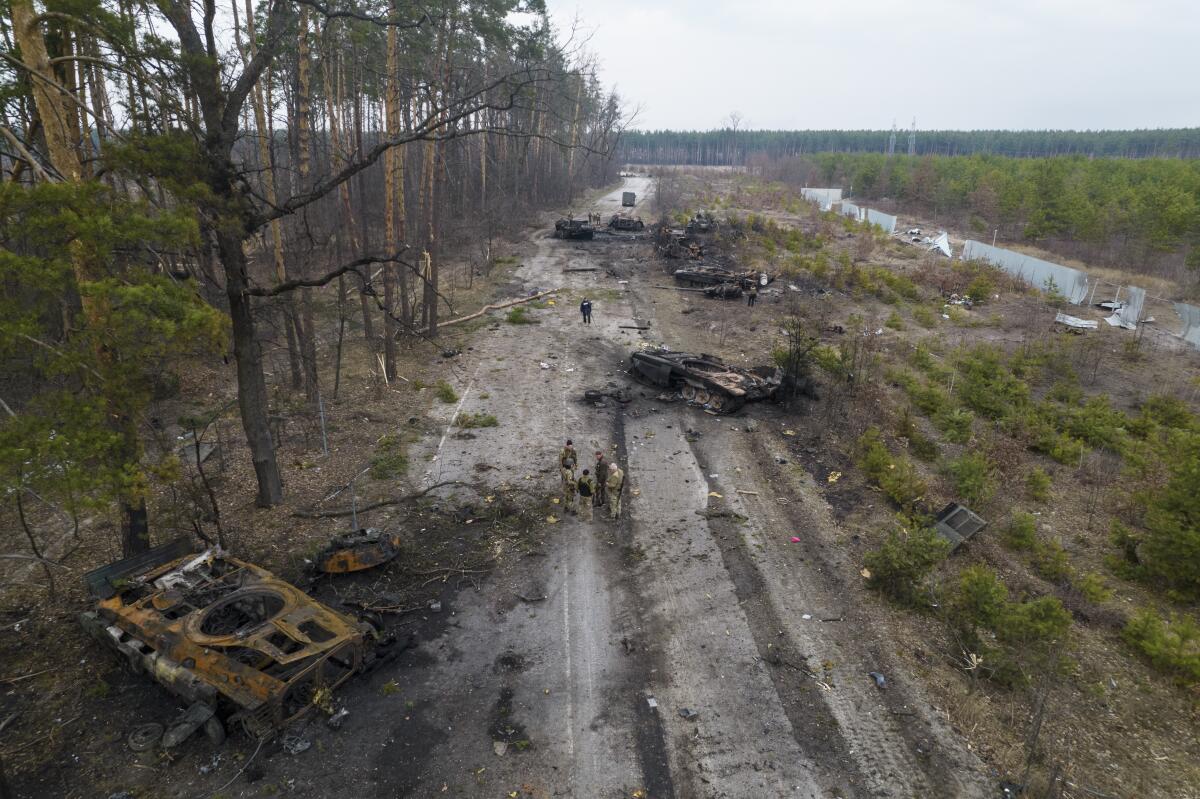
- Share via
LVIV, Ukraine — Ukrainian officials said Saturday that they had clawed back most of Kyiv and its surroundings even as they warned of executions in which civilians were bound and shot as well as renewed Russian pushes in the eastern region that is home to separatists loyal to Russia.
Ukrainian President Volodymyr Zelensky said that Russian troops were seeding northern areas of Ukraine with land mines as Moscow increasingly focused its offensive thrust on the Donbas region,
where two self-proclaimed republics are located.
His military leaders said Russian forces were attempting to encircle Ukrainian troops in parts of the Donbas and pulling away from the capital, Kyiv. They also said Ukrainian forces were now in control of Kyiv and many of the suburbs that Russia had attempted to occupy, although that could not be verified independently.
Also Saturday, the Interfax Ukraine news agency quoted Ukrainian Foreign Minister Dmytro Kuleba as saying Moscow now seemed prepared to agree to face-to-face talks between the two countries’ presidents. Such a meeting could represent a turning point in the conflict, although Western diplomats and others said they remained skeptical of Russian President Vladimir Putin’s intentions and negotiating tactics.
Zelensky warned that the dangers in his country remained real and potent.
“It’s still not possible to return to normal life, as it used to be, even at the territories that we are taking back after the fighting,” he said. “They are mining all this territory. Mining houses, equipment, even the bodies of killed people. Too many tripwire mines, too many other dangers.”
Meanwhile, as shelling and attacks continued across the country, new evacuations were planned from war-ravaged areas in the north and east, including the devastated port city of Mariupol.
According to Zelensky, more than 6,000 people were evacuated from war zones Friday through so-called humanitarian corridors, exit routes jointly agreed upon by Ukrainian and Russian officials. More than half of those evacuees were from Mariupol.
The International Committee of the Red Cross said it was planning a large-scale evacuation of residents from Mariupol again Saturday after efforts Friday were deemed too risky. Ukrainian officials said several hundred civilians made it out of Mariupol on their own Saturday but continued to await word on the Red Cross mission.
Mariupol, along the Sea of Azov in the Donbas region, has emerged as a potent symbol of the destruction and loss of life that have characterized the war. Tens of thousands of residents are reportedly trapped in Mariupol with limited access to food, water and medical care as Ukrainian defenders struggle to hold on against advancing Russian forces.
Tens of thousands of Russians want no part of Putin’s war. But forging a new life in exile isn’t easy.
Images of Mariupol, once a city of 430,000, reveal empty apartment blocks and shopping centers blackened from shelling. Much of the population has fled.
The war, now in its 39th day, has left thousands dead, forced almost one-quarter of Ukraine’s population of 44 million from their homes and created a broad swath of destruction across the nation.
Mykhailo Podolyak, an advisor to the Ukrainian president, tweeted Saturday that Russian soldiers had executed civilians in the suburb of Bucha, northwest of Kyiv.
“The bodies of people with tied hands, who were shot dead by soldiers lie in the streets,” he wrote. “These people were not in the military. They had no weapons. They posed no threat. How many more such cases are happening right now in the occupied territories?”
He included a photo from Agence France-Presse showing three bodies on the roadside, at least one of whose hands were bound.
Ukrainian troops backed by a column of tanks and armored vehicles moved farther north from Kyiv to Bucha, the Associated Press reported. The AP said its reporters counted six bodies of civilians scattered along a street and in the frontyard of a house.
In a forceful condemnation clearly directed at Putin, Pope Francis denounced a “potentate” who launched a “savage” war that included the threat of nuclear attack in an “infantile and destructive aggression.”
“We had thought that invasions of other countries, savage street fighting and atomic threats were grim memories of a distant past,” Francis said during a trip to Malta. He said he was considering visiting Kyiv.
Some Vatican watchers have suggested the pope would pull his punches in speaking of the war to avoid antagonizing Putin and his close ally, the Russian Orthodox Church. But the new comments left no room for doubt over where Francis placed the blame for the brutal onslaught.
In a video made overnight, Zelensky warned people to avoid returning to areas previously under Russian control until authorities are sure that mines had been cleared and the threat of shelling had abated.
The president described the situation in the country’s east as “extremely difficult,” as Russia bolstered troop strength and prepared for new attacks. Moscow has said its forces are concentrating on the east, where Russia has backed pro-Moscow separatist forces since 2014. The Pentagon last week confirmed that a portion of the Russian forces were pulling back but with a yet unknown final destination.
“I emphasize again: Hard battles lie ahead,” Zelensky said.
The British Defense Ministry reported that Ukrainian troops continued to advance in the Kyiv area as Russian forces pulled out.
Near the San Ysidro Port of Entry, volunteers are working around the clock to support Ukrainian families and organize them for Customs and Border Protection to process.
As the Russians have withdrawn, viral video images show vast destruction and bodies on the streets of once-occupied cities such as Irpin and Bucha.
On Saturday, Ukrainian authorities reported pre-dawn Russian missile strikes on the central cities of Kremenchuk, home of a major refinery, and Poltava. There was no immediate word on casualties. Firefighters were struggling to douse flames in Kremenchuk, an industrial hub.
The missile strikes Saturday came a day after a stunning attack on an oil depot in the Russian city of Belgorod, about 20 miles north of the Ukrainian border. It was the first such attack on Russian soil since the Russian invasion began.
Russian authorities said the attack was carried out by Ukrainian military helicopters. But Ukrainian authorities did not claim responsibility for the strike.
As the war ground on, the grim toll in deaths and displacement continued to mount.
In the western city of Lviv, largely spared destruction so far, there was more evidence of the human costs. Military funerals were held for two more soldiers. Their coffins were carried along cobblestone streets for services at the venerable Church of Saints Peter and Paul. Weeping mourners stood outside in the cold before entering the church. Such funerals have become an almost daily occurrence here.
Meanwhile, a mile and a half away at the train station, evacuees from the east and north of Ukraine continued to arrive. Many planned to continue onward to Poland and elsewhere in Europe, joining the ongoing exodus sparked by the war.
Hundreds or possibly thousands of foreign nationals have swooped into Ukraine to join the battle against the Russians.
“We didn’t want to leave — we waited a month to see how it went,” said Olga Gremova, 41, a resident of the city of Kharkiv in northeastern Ukraine. “But then the shelling became too much. It was too dangerous.”
She was among many waiting in line outside the station for a bus to Warsaw, the Polish capital. Accompanying her were her daughter, Kateryna, 15, and family friend Veronica Gubarenko, 16, who also is from Kharkiv. They shared bread and a hot meal handed out by volunteers. The morning saw snow flurries, belying the onset of spring.
“We were happy in Kharkiv, we had our family, our friends,” said Gremova, who was overcome with emotion as she spoke. “We left everything behind. But we all want to go home again. Hopefully that will be soon. I really don’t know anything about Poland. We hope this war will end soon and we can go back home.”
McDonnell reported from Lviv and Wilkinson from Washington.
More to Read
Sign up for Essential California
The most important California stories and recommendations in your inbox every morning.
You may occasionally receive promotional content from the Los Angeles Times.

